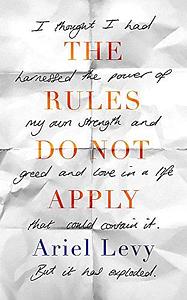Take a photo of a barcode or cover
This is an incredibly moving and heartbreaking memoir. I cannot imagine the pain Ariel Levy has experienced. Overall, it was a great read.
The title of this book grabbed me and then the description reeled me in the rest of the way. As a somewhat privileged white woman, I think it was a difficult thing to accept that "the rules are, there are no rules" when it comes to life. You are taught from an early age that if you do A, B and C, you will get success and happiness. College and a job plus working hard means success. Being a grown-up means getting a spouse, getting a spouse means having a family. These are the rules. Follow them and win at life. And then you start seeing others who haven't followed the rules getting success. And then you realize that your own idea of success eludes you.
So while some of the reviewers say that Ariel is privileged, yeah, sure. But I think she recognizes that. And it doesn't make her problems any less real. She's kind of brutal about others but I think she also uses some of that brutality on herself.
It was amazing to me the trauma of what she went through in Mongolia. In a way it was inspirational to see her get through that and come out on the other side. But also depressing in a way too. Like damn that was a really horrifying experience and she had to just keep on going afterwards.
For me the book was overall inspirational. Anyone who is going through anything difficult might find some catharsis in seeing how others have dealt with difficulties and come out on the other side.
So while some of the reviewers say that Ariel is privileged, yeah, sure. But I think she recognizes that. And it doesn't make her problems any less real. She's kind of brutal about others but I think she also uses some of that brutality on herself.
It was amazing to me the trauma of what she went through in Mongolia. In a way it was inspirational to see her get through that and come out on the other side. But also depressing in a way too. Like damn that was a really horrifying experience and she had to just keep on going afterwards.
For me the book was overall inspirational. Anyone who is going through anything difficult might find some catharsis in seeing how others have dealt with difficulties and come out on the other side.
Listened to the audio - read by the author.
At times, this one was hard to connect with for me. But this is why we read memoirs, right? To learn/live other’s experiences. I felt such extreme sadness for her as she relived the birth/loss of her son.
“But in a strange way, I am comforted by the truth. Death comes for us. You may get ten minutes on this earth or you may get eighty years but no one gets out alive. Accepting this rule gives me a funny flicker of peace.”
At times, this one was hard to connect with for me. But this is why we read memoirs, right? To learn/live other’s experiences. I felt such extreme sadness for her as she relived the birth/loss of her son.
“But in a strange way, I am comforted by the truth. Death comes for us. You may get ten minutes on this earth or you may get eighty years but no one gets out alive. Accepting this rule gives me a funny flicker of peace.”
Thanks to the giveaway from Goodreads, I was able to read this book the old fashioned way: a book with actual pages made of paper. I'd forgotten how much I enjoyed reading books that way!
I really liked this book and wanted to keep reading. I really couldn't put it down because I loved the way she wrote. I'd read an article or two of Ariel's but this was on another level. She knows how to put a sentence together..and then sentenceS together.
I really liked this book and wanted to keep reading. I really couldn't put it down because I loved the way she wrote. I'd read an article or two of Ariel's but this was on another level. She knows how to put a sentence together..and then sentenceS together.
So torn on this. I'd read her essay that she wrote before this full memoir, and was really captivated by it, so I thought I was going to love this more than I did. I still thought the writing was really good and there were snippets that really stood out, so maybe it should have just been a series of short stories? I think part of my issue was also that SO many tragic things happened to her, it almost numbed the effect of each of them.
I was so struck by Levy's "Thanksgiving in Mongolia" piece in the New Yorker a few years ago and expected to feel similarly awed by this memoir, but parts of it fell short for me. Her writing seems effortless and is engaging, but the most touching and honest parts of the book seems to be the chapter on Mongolia and the one about the weeks immediately following her return. Although Levy reveals several intimate details of her life here, she does so with a detachment in many instances that left me wanting. Vast parts of the book lack the immediacy and vulnerability that made "Thanksgiving in Mongolia" so incredible. And yet... there are some really beautiful moments and revelations near the end that make me wonder if I should overlook my frustrations with the first half of the book. I have gone back and forth between giving the book three stars or four over the last several hours since I initially posted this review. I have decided in favor of four because I cannot stop thinking about certain moments and sentences in the book and even went back to re-read the last few chapters this afternoon. Also, I have to recognize that it takes a hell of a lot of talent and good writing to coherently pull together everything that Levy did in this memoir.
Rating 3 out of 5 simply because the author's melodrama about her "ruined life" didn't really agree with me. Mostly because her life wasn't ruined... she had just hit a slight rough patch in an otherwise privileged life. The book was very engaging to read (thus the three stars instead of the one star), but when I finished I wasn't left with any sense of what the point of it all was - as the idea that "you can't control everything", doesn't seem like a nuanced enough idea to be worthy of all of these pages.
Maybe it’s my mental state or maybe the topics that are sensitive to me, monogamy and fertility. Maybe it’s because I’ve read enough books about death and loneliness and mortality to last a life time, but I can only give this book a 3. Chapter 25 redeems the book to give it the 2nd star and the 3rd comes in the talented way the author writes. Weaving and intertwining her story to read and end exactly how she wanted it to. I enjoyed it. It just hit too close to home for me to give any higher of a rating.
When life has rules we are comforted by it's structure. Then life happens. You ask why didn't the rules protect me? In this book you find out how the Rules Do Not Apply in Ariel Levy's life. Is there a recipe for disaster or does life just happen the way it does? If there is no cause and effect, how do people trying to comfort you also keep from worrying about those things happening to them. How do they assure themselves that they are doing all the things that will prevent those things from happening to them.
Three things:
1. I love Levy's expansive vocabulary - it is impressive without being pretentious.
2. The first 2/3rds of this was really good, but the last 1/3 fell flat for me. I think Levy has another book in her (at least) delving into the pitfalls of the "anything goes/follow your passion" mentality that our generation has been steeped in growing up. Certainly, much freedom has come from that, but there are some potential downsides too. She skirts around the edges of them in The Rules, but I think she could have down some more introspective work...hopefully in her next book!
3. "Freedom, however, is not the last word. Freedom is only part of the story and half of the truth." Viktor Frankl
1. I love Levy's expansive vocabulary - it is impressive without being pretentious.
2. The first 2/3rds of this was really good, but the last 1/3 fell flat for me. I think Levy has another book in her (at least) delving into the pitfalls of the "anything goes/follow your passion" mentality that our generation has been steeped in growing up. Certainly, much freedom has come from that, but there are some potential downsides too. She skirts around the edges of them in The Rules, but I think she could have down some more introspective work...hopefully in her next book!
3. "Freedom, however, is not the last word. Freedom is only part of the story and half of the truth." Viktor Frankl






